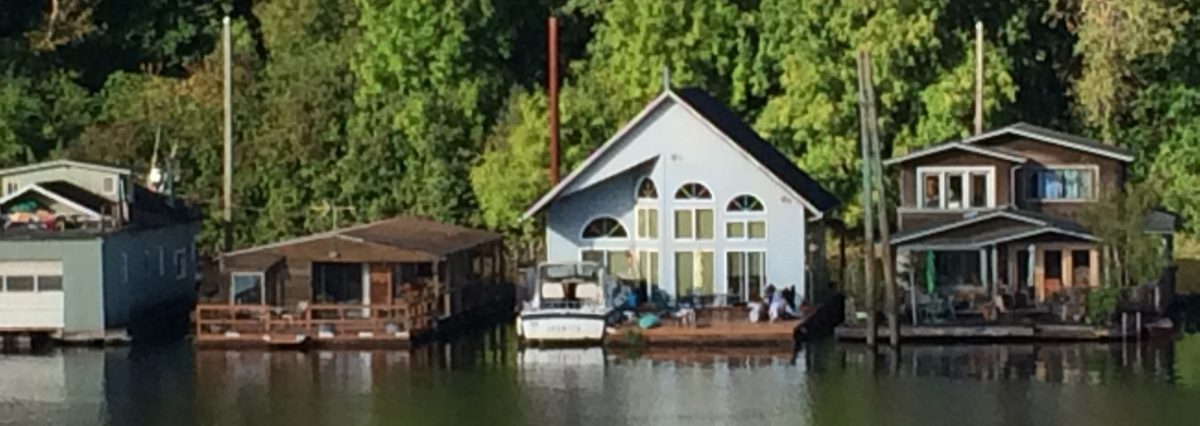Oregon state law protects certain rights of floating home owners who own their home but rent their slip. Of the roughly 1,500 floating homes there are in Oregon, about 750 of them are located in rental moorages. When you own the home and rent the slip, you enter into a lease agreement with the owner of the moorage to which the home is moored. This lease establishes a landlord-tenant relationship between the floating home owner and the marina owner.
Under Oregon law, the rights of floating home owners are protected under general Oregon statue law governing typical landlord-tenant relationships (ORS Chapter 90) which protect tenants rights to use a rented space but also protects landlord property which is typically the dwelling that the tenant occupies. However, due to the unique situation which occurs when a floating home is owned by someone who is not the person who owns the rights to the water on which the floating home rests, general landlord-tenant law which protects a landlord’s property (typically a dwelling) does not apply to this scenario. Therefore, additional protective legislation was created to allow additional protections for the floating home owner tenant to ensure that marina landlords could not evict tenants for no cause and risk tenants losing their homes. These additional laws and protections are found in ORS Chapter 90.505 – 90.830. (All links contained on this page are also collectively located on the RESOURCES AND LINKS page).
Key things to keep in mind when reviewing the laws are:
- Due to the similarities of circumstance, the laws which protect floating home owners who rent slips in moorages are nearly identical to the laws which protect manufactured home owners who rent space in a manufactured dwelling park.
- Due to the affordable nature of manufactured homes, many people who purchase manufactured homes in parks live on low or fixed-incomes and some are of retirement age, seeking retirement communities. With the majority of the 90,000 Oregon manufactured home owners falling into these demographics, living in parks can create an increased potential for landlord power abuse of its tenants. Because of this, Oregon state has several state associations dedicated to protecting manufactured home owners’ rights, educating and advocating for them.
- While there are nearly 90,000 manufactured dwellings in rental parks in Oregon, there are only about 750 floating homes that fall under this kind of landlord-tenant relationship.
- Because of the relatively small group of floating home owners these laws apply to, there have not historically been, nor are there now, any separate, state-funded associations which assist floating home owners in landlord-tenant issues.
- The Manufactured Housing Coalition (MHC) has been meeting since the late 1990s to meet with representatives from the both the floating home marina and manufactured dwelling park communities, as well as key legislators to draft legislation that becomes law. The MHC consists of manufactured dwelling park home owners, park owners/managers, park attorneys, floating home owners, and marina owners/managers. Marina owners and their attorneys regularly attend these meetings and weigh in on important issues for them. The marina landlord voices are well-represented. Floating home owners have not participated regularly, hence there is legislation which has not kept as current on specifically addressing floating home tenant concerns.
In conclusion, don’t let the name deceive you – the MHC (Manufactured Housing Coalition) is THE group involved in protecting the rights of both floating homeowners, as well as floating home marina owners.
You will see links to resources on this website that refer to manufactured dwelling park tenants – these are relevant to floating home owners.***
***The separate landlord-tenant laws that protect floating home owners are the same set of laws that protect manufactured dwelling park homeowners, not in all cases, but about 95% of the laws serve both communities (scroll down to see the ways in which the tenant-landlord laws differ between park and marina communities). So, do not make the mistake of ignoring a publication because it doesn’t specifically reference floating home owners. Likewise, there are about 5% of the laws that only apply to manufactured dwelling parks and NOT floating homeowners, so be careful in your assumptions that direction as well.
To gain the most benefit from these resources, we suggest doing the following:
- Familiarize yourself with ORS 90.505 – 90.830. Keep in mind that all of Chapter 90 applies to you, but that 90.505 – 90.830 offer ADDITIONAL protections above standard landlord-tenant laws.
- Read the publication links provided on the RESOURCES AND LINKS page regarding manufactured housing tenant laws to help you better understand and interpret the laws in ORS.
- If you are unclear about a law and would like more information to help you understand how it applies to your situation, hire an attorney who is familiar with ORS 90.501-90.830 to answer any questions you might have. Standard landlord-tenant attorneys typically do NOT know or understand the floating home laws.
- Participate in the monthly MHC meetings (alternating between Salem and Tigard and can be found on the EVENTS page) to further understand the laws, weigh in on important issues which affect your rights, defend your rights against proposed legislation that leans in favor of landlords, and raise awareness to floating home tenant issues that are meaningful to you.
For more information on how your participation in MHC contributes to the making of a law, click here.
